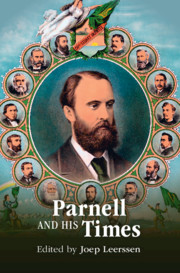Book contents
- Parnell and His Times
- Frontispiece
- Parnell and His Times
- Copyright page
- Dedication
- Contents
- Illustrations
- Contributors
- Acknowledgement
- Introduction
- Part I Parnell’s Ireland and Its Different Temporalities
- Chapter 1 O’Connell and Parnell
- Chapter 2 The Paradoxes of Parnell
- Chapter 3 Parnell to Pearse
- Chapter 4 Race, Nation, State
- Chapter 5 Parnell’s Other Ireland
- Chapter 6 Inside History
- Chapter 7 Digesting the Past
- Chapter 8 The Writing of County Histories in Parnell’s Ireland
- Part II After Parnell
- Index
Chapter 8 - The Writing of County Histories in Parnell’s Ireland
from Part I - Parnell’s Ireland and Its Different Temporalities
Published online by Cambridge University Press: 03 December 2020
- Parnell and His Times
- Frontispiece
- Parnell and His Times
- Copyright page
- Dedication
- Contents
- Illustrations
- Contributors
- Acknowledgement
- Introduction
- Part I Parnell’s Ireland and Its Different Temporalities
- Chapter 1 O’Connell and Parnell
- Chapter 2 The Paradoxes of Parnell
- Chapter 3 Parnell to Pearse
- Chapter 4 Race, Nation, State
- Chapter 5 Parnell’s Other Ireland
- Chapter 6 Inside History
- Chapter 7 Digesting the Past
- Chapter 8 The Writing of County Histories in Parnell’s Ireland
- Part II After Parnell
- Index
Summary
Writing county histories had been a Protestant pursuit since counties in Ireland were considered transplanted Anglicizing units, and county representation in parliament had been the preserve of landed Protestant families. When this latter changed in the nineteenth century, and when the narrative of Ireland’s national history came to be even more contested along political and denominational lines, members of elite families resorted to county histories to demonstrate both how their ancestors had shaped society at a county level and why, notwithstanding political and denominational differences, people should take pride in the improvements that had been introduced to their counties and towns usually at the initiative of local elites and, more recently, of government. This chapter explains, in the cases of Counties Sligo and Clare, how such elite histories provoked priest historians to write counter-narratives where ‘the people’, by which they meant the Catholic population of the respective counties, constituted the community, and elites were decried as foreign, usually Protestant, intruders whose time had passed. For these authors, county history was national history writ small, where, through the skilful deployment of remembered local grievances, they could better mobilize popular support, including among county exiles, for Catholic and Nationalist causes.
Keywords
- Type
- Chapter
- Information
- Parnell and his Times , pp. 148 - 173Publisher: Cambridge University PressPrint publication year: 2020



